LAW93104 Consumer Law: Advice on Munchkins R Us' Supplier Club
VerifiedAdded on 2022/11/22
|9
|1762
|287
Report
AI Summary
This assignment is a legal advice letter prepared for Ms. Melissa Rogers, the Legal Compliance Officer at Munchkins R Us, a large Australian toy store chain. The letter addresses the legal implications of the ACCC v Woolworths Limited [2016] FCA 1472 and ACCC v Coles Supermarkets Australia Pty Ltd [2014] FCA 1405 cases, focusing on unconscionable conduct under the Competition and Consumer Act 2010. The advice is given in the context of Munchkins R Us' recently established 'Special Suppliers Club,' which charges suppliers a monthly fee for membership and offers benefits. The letter analyzes potential legal issues arising from the club's structure, referencing the cases to highlight risks related to product safety, unfair extraction of payments, and misleading conduct. The advice emphasizes the importance of written contracts, fair dealing, and compliance with consumer law, recommending that Munchkins R Us avoid practices that could be construed as unconscionable or misleading. The letter also references Commercial Bank of Australia Ltd v Amadio and ACCC v Samton Holdings Pty Ltd to strengthen the arguments and provides detailed guidance on sections 18, 21, 23 and 52 of the Australian Consumer Law, offering recommendations to ensure compliance and mitigate legal risks associated with the Special Suppliers Club.
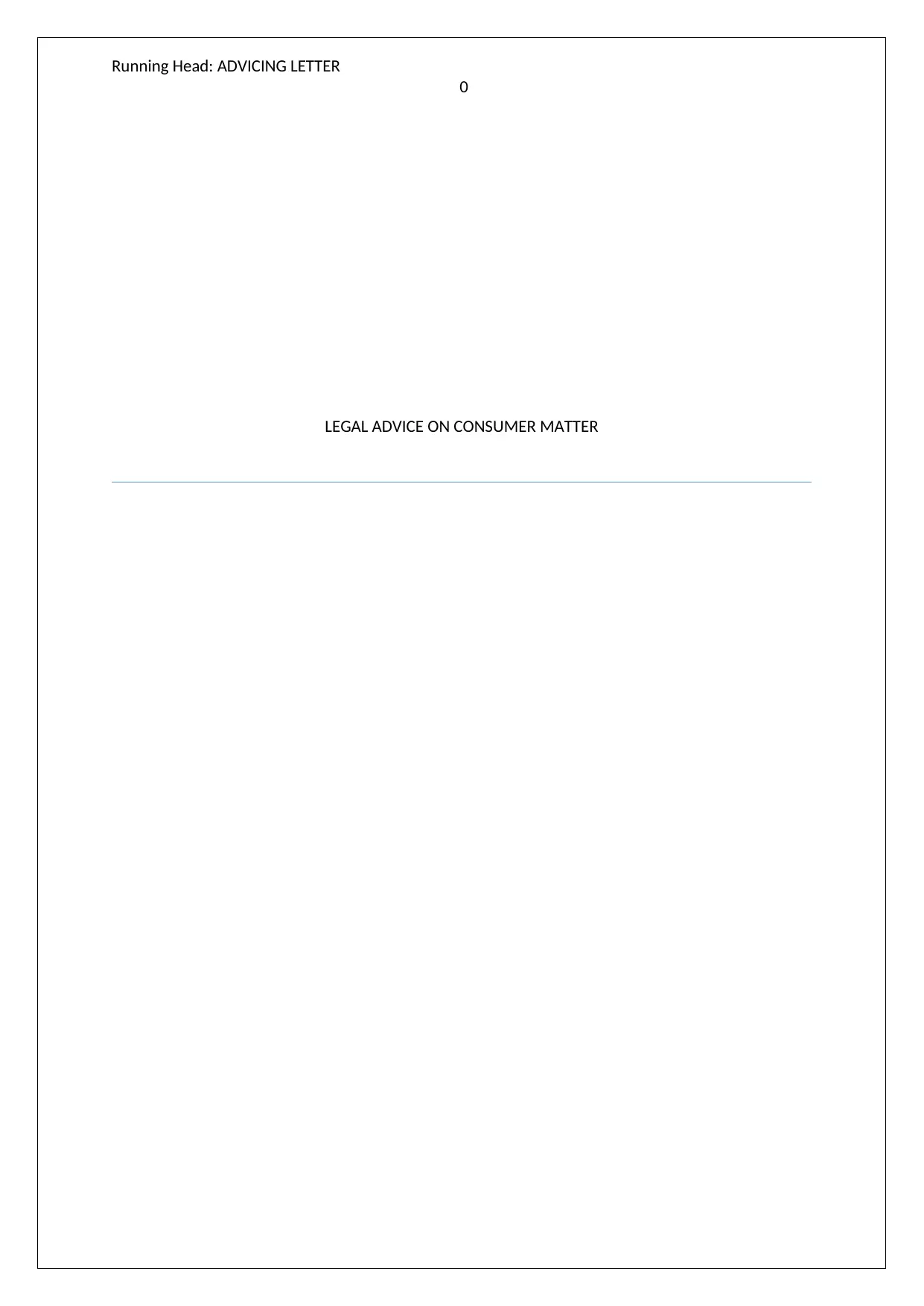
Running Head: ADVICING LETTER
0
LEGAL ADVICE ON CONSUMER MATTER
0
LEGAL ADVICE ON CONSUMER MATTER
Paraphrase This Document
Need a fresh take? Get an instant paraphrase of this document with our AI Paraphraser
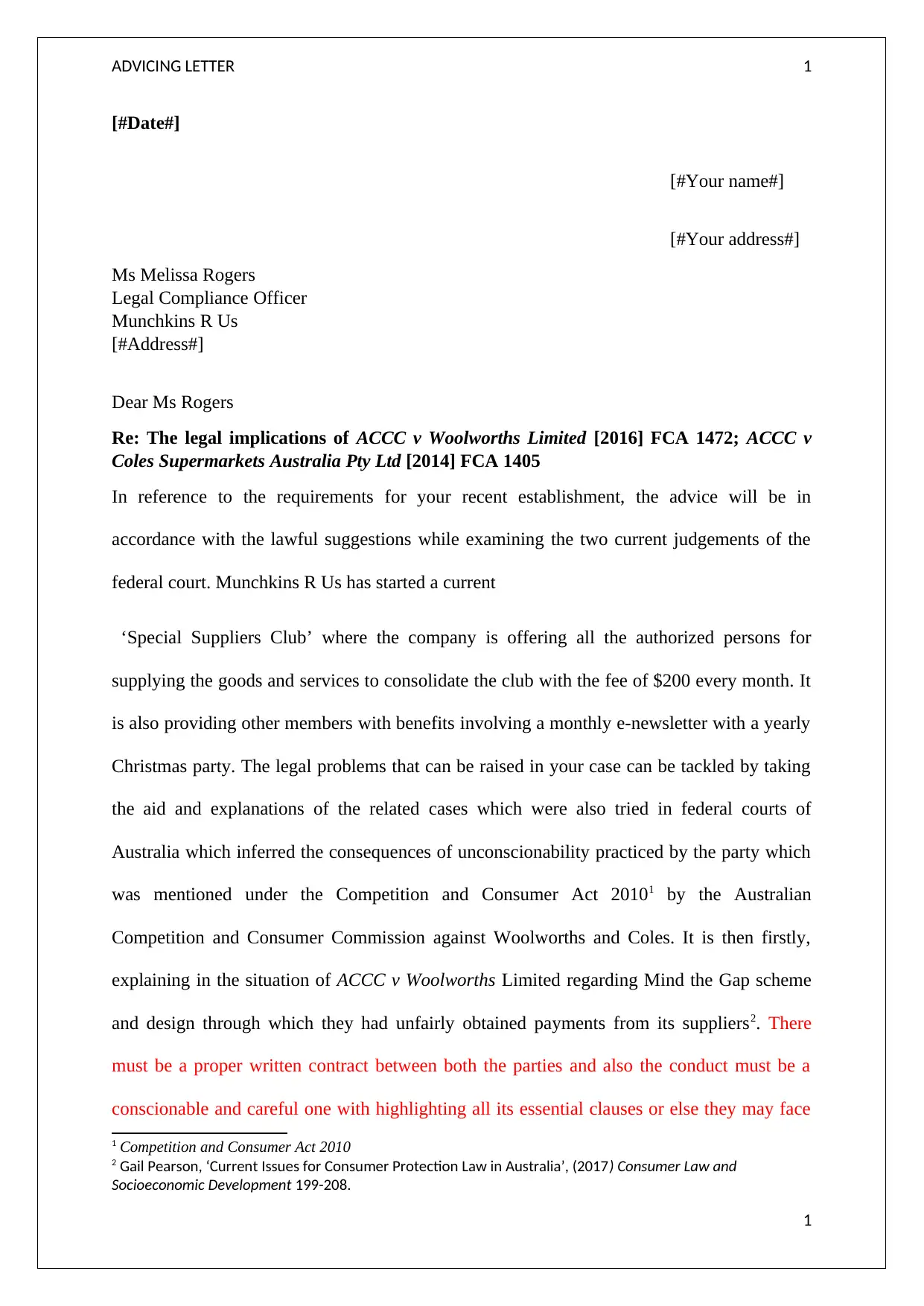
ADVICING LETTER 1
[#Date#]
[#Your name#]
[#Your address#]
Ms Melissa Rogers
Legal Compliance Officer
Munchkins R Us
[#Address#]
Dear Ms Rogers
Re: The legal implications of ACCC v Woolworths Limited [2016] FCA 1472; ACCC v
Coles Supermarkets Australia Pty Ltd [2014] FCA 1405
In reference to the requirements for your recent establishment, the advice will be in
accordance with the lawful suggestions while examining the two current judgements of the
federal court. Munchkins R Us has started a current
‘Special Suppliers Club’ where the company is offering all the authorized persons for
supplying the goods and services to consolidate the club with the fee of $200 every month. It
is also providing other members with benefits involving a monthly e-newsletter with a yearly
Christmas party. The legal problems that can be raised in your case can be tackled by taking
the aid and explanations of the related cases which were also tried in federal courts of
Australia which inferred the consequences of unconscionability practiced by the party which
was mentioned under the Competition and Consumer Act 20101 by the Australian
Competition and Consumer Commission against Woolworths and Coles. It is then firstly,
explaining in the situation of ACCC v Woolworths Limited regarding Mind the Gap scheme
and design through which they had unfairly obtained payments from its suppliers2. There
must be a proper written contract between both the parties and also the conduct must be a
conscionable and careful one with highlighting all its essential clauses or else they may face
1 Competition and Consumer Act 2010
2 Gail Pearson, ‘Current Issues for Consumer Protection Law in Australia’, (2017) Consumer Law and
Socioeconomic Development 199-208.
1
[#Date#]
[#Your name#]
[#Your address#]
Ms Melissa Rogers
Legal Compliance Officer
Munchkins R Us
[#Address#]
Dear Ms Rogers
Re: The legal implications of ACCC v Woolworths Limited [2016] FCA 1472; ACCC v
Coles Supermarkets Australia Pty Ltd [2014] FCA 1405
In reference to the requirements for your recent establishment, the advice will be in
accordance with the lawful suggestions while examining the two current judgements of the
federal court. Munchkins R Us has started a current
‘Special Suppliers Club’ where the company is offering all the authorized persons for
supplying the goods and services to consolidate the club with the fee of $200 every month. It
is also providing other members with benefits involving a monthly e-newsletter with a yearly
Christmas party. The legal problems that can be raised in your case can be tackled by taking
the aid and explanations of the related cases which were also tried in federal courts of
Australia which inferred the consequences of unconscionability practiced by the party which
was mentioned under the Competition and Consumer Act 20101 by the Australian
Competition and Consumer Commission against Woolworths and Coles. It is then firstly,
explaining in the situation of ACCC v Woolworths Limited regarding Mind the Gap scheme
and design through which they had unfairly obtained payments from its suppliers2. There
must be a proper written contract between both the parties and also the conduct must be a
conscionable and careful one with highlighting all its essential clauses or else they may face
1 Competition and Consumer Act 2010
2 Gail Pearson, ‘Current Issues for Consumer Protection Law in Australia’, (2017) Consumer Law and
Socioeconomic Development 199-208.
1
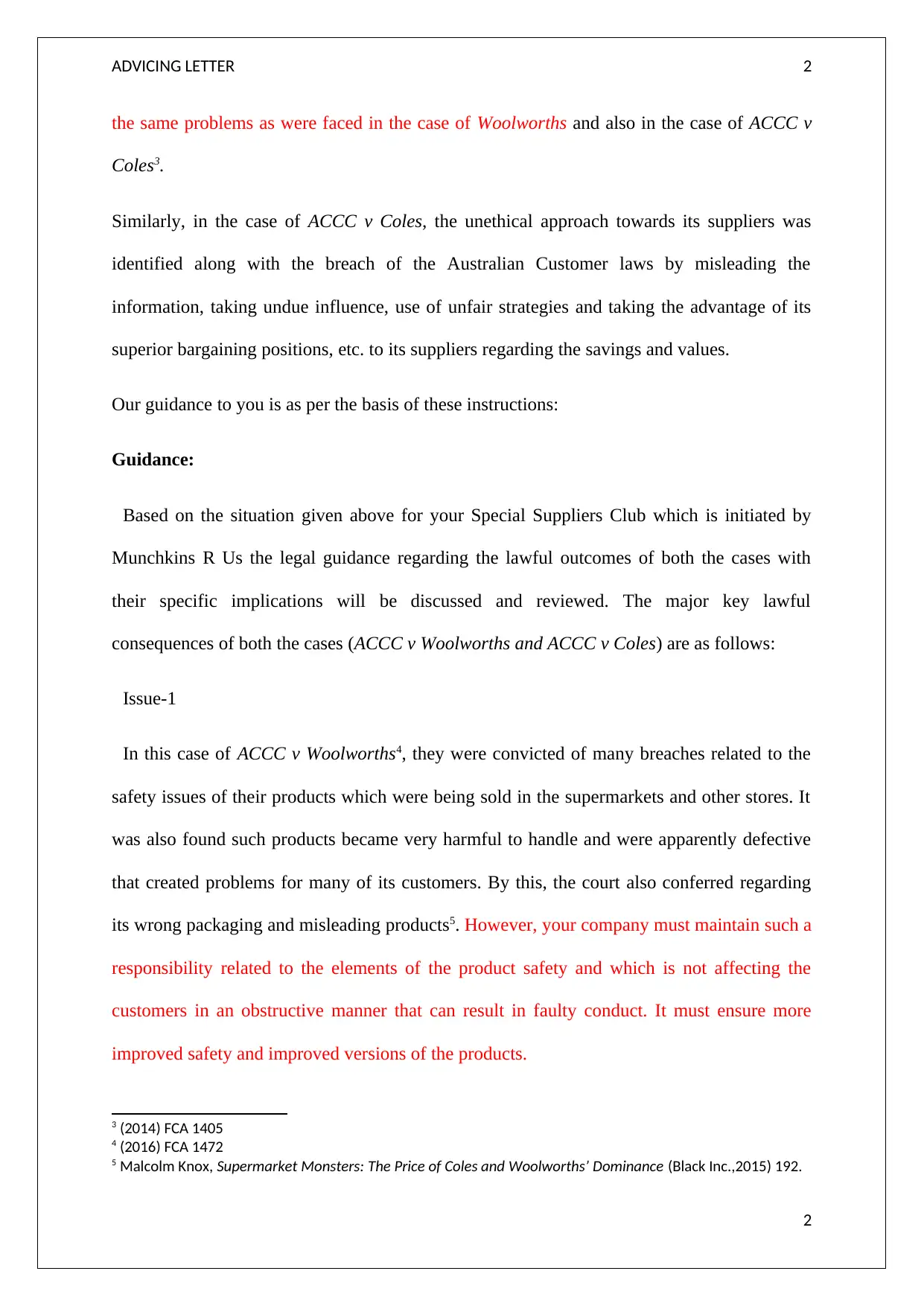
ADVICING LETTER 2
the same problems as were faced in the case of Woolworths and also in the case of ACCC v
Coles3.
Similarly, in the case of ACCC v Coles, the unethical approach towards its suppliers was
identified along with the breach of the Australian Customer laws by misleading the
information, taking undue influence, use of unfair strategies and taking the advantage of its
superior bargaining positions, etc. to its suppliers regarding the savings and values.
Our guidance to you is as per the basis of these instructions:
Guidance:
Based on the situation given above for your Special Suppliers Club which is initiated by
Munchkins R Us the legal guidance regarding the lawful outcomes of both the cases with
their specific implications will be discussed and reviewed. The major key lawful
consequences of both the cases (ACCC v Woolworths and ACCC v Coles) are as follows:
Issue-1
In this case of ACCC v Woolworths4, they were convicted of many breaches related to the
safety issues of their products which were being sold in the supermarkets and other stores. It
was also found such products became very harmful to handle and were apparently defective
that created problems for many of its customers. By this, the court also conferred regarding
its wrong packaging and misleading products5. However, your company must maintain such a
responsibility related to the elements of the product safety and which is not affecting the
customers in an obstructive manner that can result in faulty conduct. It must ensure more
improved safety and improved versions of the products.
3 (2014) FCA 1405
4 (2016) FCA 1472
5 Malcolm Knox, Supermarket Monsters: The Price of Coles and Woolworths’ Dominance (Black Inc.,2015) 192.
2
the same problems as were faced in the case of Woolworths and also in the case of ACCC v
Coles3.
Similarly, in the case of ACCC v Coles, the unethical approach towards its suppliers was
identified along with the breach of the Australian Customer laws by misleading the
information, taking undue influence, use of unfair strategies and taking the advantage of its
superior bargaining positions, etc. to its suppliers regarding the savings and values.
Our guidance to you is as per the basis of these instructions:
Guidance:
Based on the situation given above for your Special Suppliers Club which is initiated by
Munchkins R Us the legal guidance regarding the lawful outcomes of both the cases with
their specific implications will be discussed and reviewed. The major key lawful
consequences of both the cases (ACCC v Woolworths and ACCC v Coles) are as follows:
Issue-1
In this case of ACCC v Woolworths4, they were convicted of many breaches related to the
safety issues of their products which were being sold in the supermarkets and other stores. It
was also found such products became very harmful to handle and were apparently defective
that created problems for many of its customers. By this, the court also conferred regarding
its wrong packaging and misleading products5. However, your company must maintain such a
responsibility related to the elements of the product safety and which is not affecting the
customers in an obstructive manner that can result in faulty conduct. It must ensure more
improved safety and improved versions of the products.
3 (2014) FCA 1405
4 (2016) FCA 1472
5 Malcolm Knox, Supermarket Monsters: The Price of Coles and Woolworths’ Dominance (Black Inc.,2015) 192.
2
⊘ This is a preview!⊘
Do you want full access?
Subscribe today to unlock all pages.

Trusted by 1+ million students worldwide
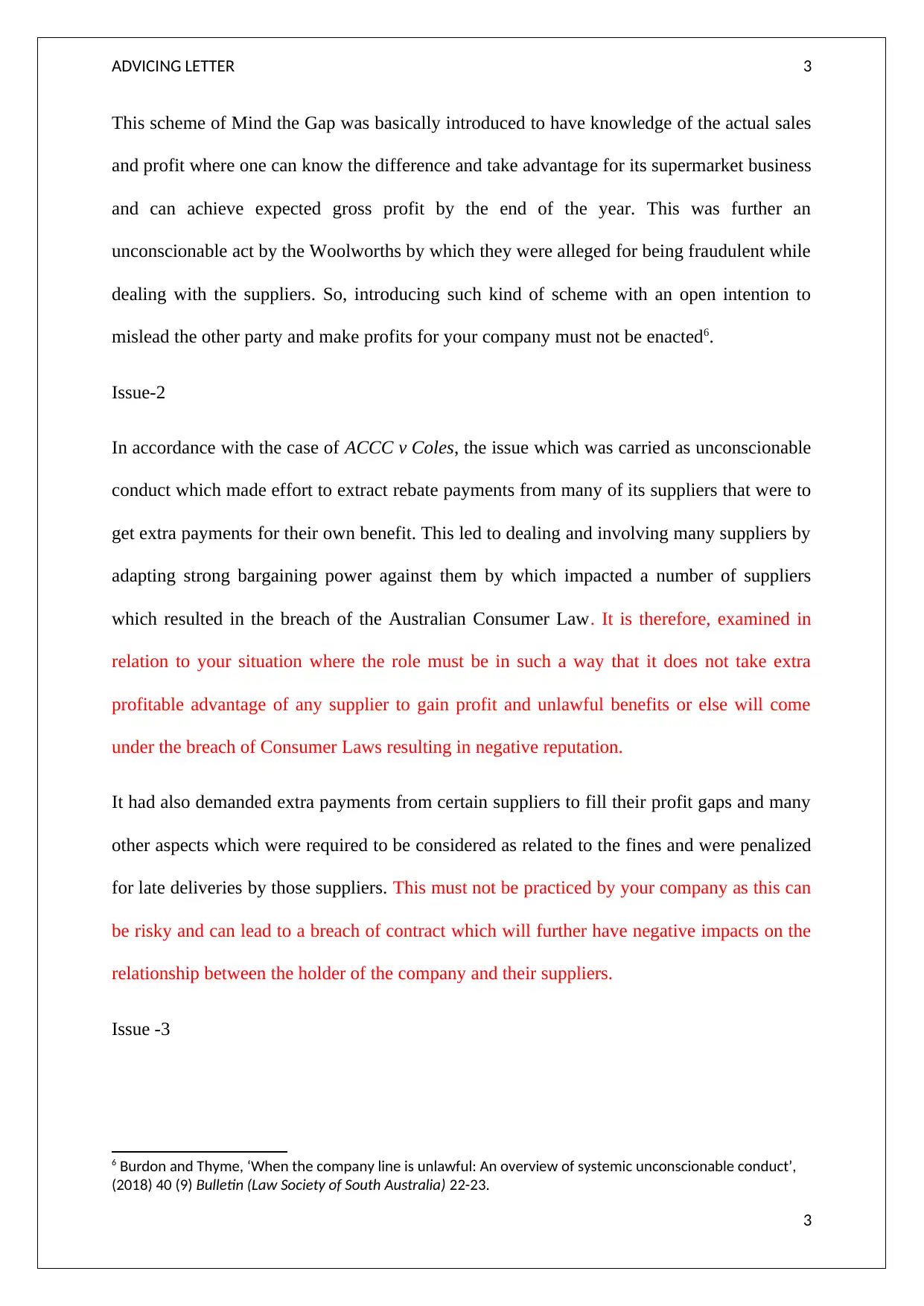
ADVICING LETTER 3
This scheme of Mind the Gap was basically introduced to have knowledge of the actual sales
and profit where one can know the difference and take advantage for its supermarket business
and can achieve expected gross profit by the end of the year. This was further an
unconscionable act by the Woolworths by which they were alleged for being fraudulent while
dealing with the suppliers. So, introducing such kind of scheme with an open intention to
mislead the other party and make profits for your company must not be enacted6.
Issue-2
In accordance with the case of ACCC v Coles, the issue which was carried as unconscionable
conduct which made effort to extract rebate payments from many of its suppliers that were to
get extra payments for their own benefit. This led to dealing and involving many suppliers by
adapting strong bargaining power against them by which impacted a number of suppliers
which resulted in the breach of the Australian Consumer Law. It is therefore, examined in
relation to your situation where the role must be in such a way that it does not take extra
profitable advantage of any supplier to gain profit and unlawful benefits or else will come
under the breach of Consumer Laws resulting in negative reputation.
It had also demanded extra payments from certain suppliers to fill their profit gaps and many
other aspects which were required to be considered as related to the fines and were penalized
for late deliveries by those suppliers. This must not be practiced by your company as this can
be risky and can lead to a breach of contract which will further have negative impacts on the
relationship between the holder of the company and their suppliers.
Issue -3
6 Burdon and Thyme, ‘When the company line is unlawful: An overview of systemic unconscionable conduct’,
(2018) 40 (9) Bulletin (Law Society of South Australia) 22-23.
3
This scheme of Mind the Gap was basically introduced to have knowledge of the actual sales
and profit where one can know the difference and take advantage for its supermarket business
and can achieve expected gross profit by the end of the year. This was further an
unconscionable act by the Woolworths by which they were alleged for being fraudulent while
dealing with the suppliers. So, introducing such kind of scheme with an open intention to
mislead the other party and make profits for your company must not be enacted6.
Issue-2
In accordance with the case of ACCC v Coles, the issue which was carried as unconscionable
conduct which made effort to extract rebate payments from many of its suppliers that were to
get extra payments for their own benefit. This led to dealing and involving many suppliers by
adapting strong bargaining power against them by which impacted a number of suppliers
which resulted in the breach of the Australian Consumer Law. It is therefore, examined in
relation to your situation where the role must be in such a way that it does not take extra
profitable advantage of any supplier to gain profit and unlawful benefits or else will come
under the breach of Consumer Laws resulting in negative reputation.
It had also demanded extra payments from certain suppliers to fill their profit gaps and many
other aspects which were required to be considered as related to the fines and were penalized
for late deliveries by those suppliers. This must not be practiced by your company as this can
be risky and can lead to a breach of contract which will further have negative impacts on the
relationship between the holder of the company and their suppliers.
Issue -3
6 Burdon and Thyme, ‘When the company line is unlawful: An overview of systemic unconscionable conduct’,
(2018) 40 (9) Bulletin (Law Society of South Australia) 22-23.
3
Paraphrase This Document
Need a fresh take? Get an instant paraphrase of this document with our AI Paraphraser
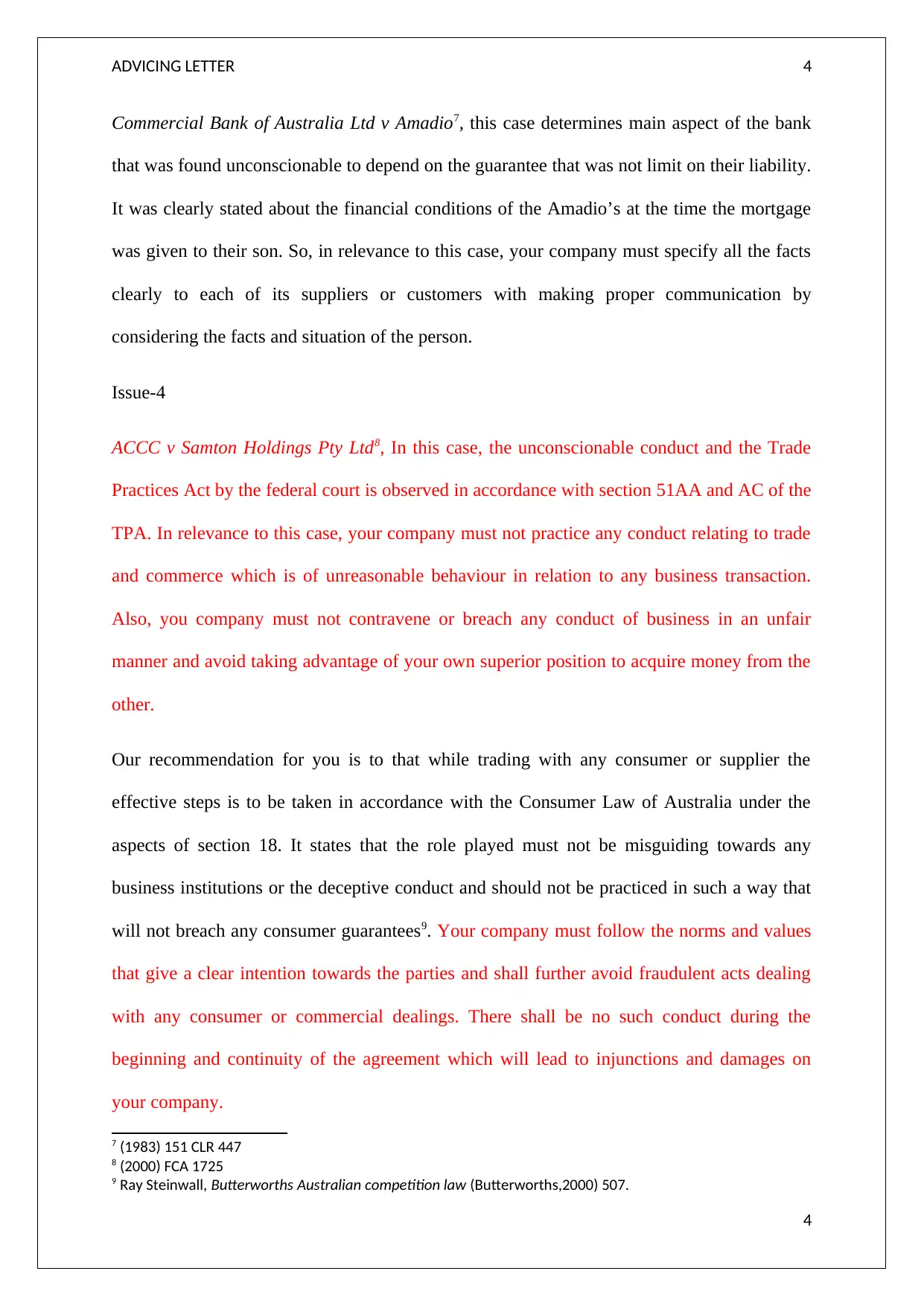
ADVICING LETTER 4
Commercial Bank of Australia Ltd v Amadio7, this case determines main aspect of the bank
that was found unconscionable to depend on the guarantee that was not limit on their liability.
It was clearly stated about the financial conditions of the Amadio’s at the time the mortgage
was given to their son. So, in relevance to this case, your company must specify all the facts
clearly to each of its suppliers or customers with making proper communication by
considering the facts and situation of the person.
Issue-4
ACCC v Samton Holdings Pty Ltd8, In this case, the unconscionable conduct and the Trade
Practices Act by the federal court is observed in accordance with section 51AA and AC of the
TPA. In relevance to this case, your company must not practice any conduct relating to trade
and commerce which is of unreasonable behaviour in relation to any business transaction.
Also, you company must not contravene or breach any conduct of business in an unfair
manner and avoid taking advantage of your own superior position to acquire money from the
other.
Our recommendation for you is to that while trading with any consumer or supplier the
effective steps is to be taken in accordance with the Consumer Law of Australia under the
aspects of section 18. It states that the role played must not be misguiding towards any
business institutions or the deceptive conduct and should not be practiced in such a way that
will not breach any consumer guarantees9. Your company must follow the norms and values
that give a clear intention towards the parties and shall further avoid fraudulent acts dealing
with any consumer or commercial dealings. There shall be no such conduct during the
beginning and continuity of the agreement which will lead to injunctions and damages on
your company.
7 (1983) 151 CLR 447
8 (2000) FCA 1725
9 Ray Steinwall, Butterworths Australian competition law (Butterworths,2000) 507.
4
Commercial Bank of Australia Ltd v Amadio7, this case determines main aspect of the bank
that was found unconscionable to depend on the guarantee that was not limit on their liability.
It was clearly stated about the financial conditions of the Amadio’s at the time the mortgage
was given to their son. So, in relevance to this case, your company must specify all the facts
clearly to each of its suppliers or customers with making proper communication by
considering the facts and situation of the person.
Issue-4
ACCC v Samton Holdings Pty Ltd8, In this case, the unconscionable conduct and the Trade
Practices Act by the federal court is observed in accordance with section 51AA and AC of the
TPA. In relevance to this case, your company must not practice any conduct relating to trade
and commerce which is of unreasonable behaviour in relation to any business transaction.
Also, you company must not contravene or breach any conduct of business in an unfair
manner and avoid taking advantage of your own superior position to acquire money from the
other.
Our recommendation for you is to that while trading with any consumer or supplier the
effective steps is to be taken in accordance with the Consumer Law of Australia under the
aspects of section 18. It states that the role played must not be misguiding towards any
business institutions or the deceptive conduct and should not be practiced in such a way that
will not breach any consumer guarantees9. Your company must follow the norms and values
that give a clear intention towards the parties and shall further avoid fraudulent acts dealing
with any consumer or commercial dealings. There shall be no such conduct during the
beginning and continuity of the agreement which will lead to injunctions and damages on
your company.
7 (1983) 151 CLR 447
8 (2000) FCA 1725
9 Ray Steinwall, Butterworths Australian competition law (Butterworths,2000) 507.
4
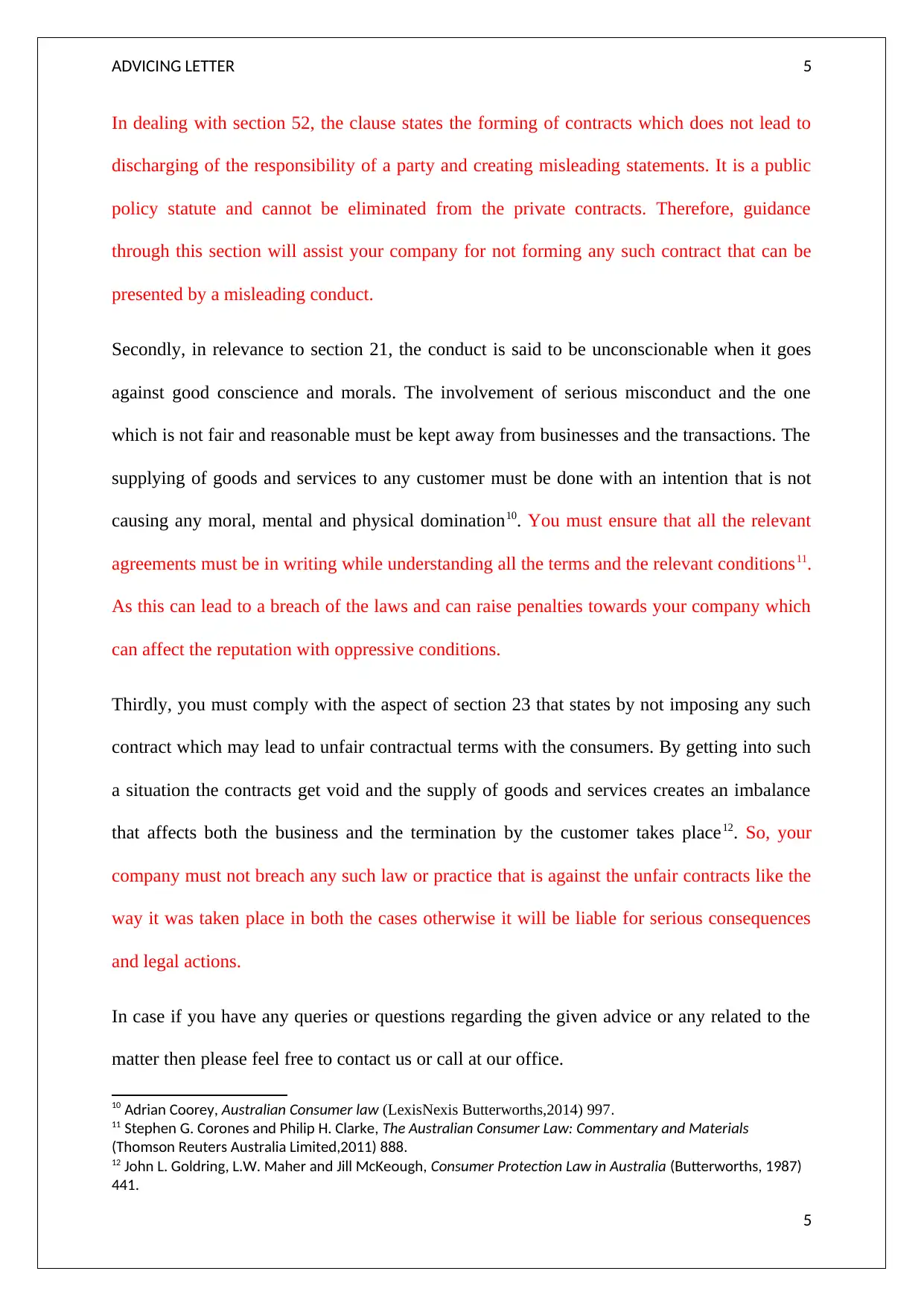
ADVICING LETTER 5
In dealing with section 52, the clause states the forming of contracts which does not lead to
discharging of the responsibility of a party and creating misleading statements. It is a public
policy statute and cannot be eliminated from the private contracts. Therefore, guidance
through this section will assist your company for not forming any such contract that can be
presented by a misleading conduct.
Secondly, in relevance to section 21, the conduct is said to be unconscionable when it goes
against good conscience and morals. The involvement of serious misconduct and the one
which is not fair and reasonable must be kept away from businesses and the transactions. The
supplying of goods and services to any customer must be done with an intention that is not
causing any moral, mental and physical domination10. You must ensure that all the relevant
agreements must be in writing while understanding all the terms and the relevant conditions11.
As this can lead to a breach of the laws and can raise penalties towards your company which
can affect the reputation with oppressive conditions.
Thirdly, you must comply with the aspect of section 23 that states by not imposing any such
contract which may lead to unfair contractual terms with the consumers. By getting into such
a situation the contracts get void and the supply of goods and services creates an imbalance
that affects both the business and the termination by the customer takes place12. So, your
company must not breach any such law or practice that is against the unfair contracts like the
way it was taken place in both the cases otherwise it will be liable for serious consequences
and legal actions.
In case if you have any queries or questions regarding the given advice or any related to the
matter then please feel free to contact us or call at our office.
10 Adrian Coorey, Australian Consumer law (LexisNexis Butterworths,2014) 997.
11 Stephen G. Corones and Philip H. Clarke, The Australian Consumer Law: Commentary and Materials
(Thomson Reuters Australia Limited,2011) 888.
12 John L. Goldring, L.W. Maher and Jill McKeough, Consumer Protection Law in Australia (Butterworths, 1987)
441.
5
In dealing with section 52, the clause states the forming of contracts which does not lead to
discharging of the responsibility of a party and creating misleading statements. It is a public
policy statute and cannot be eliminated from the private contracts. Therefore, guidance
through this section will assist your company for not forming any such contract that can be
presented by a misleading conduct.
Secondly, in relevance to section 21, the conduct is said to be unconscionable when it goes
against good conscience and morals. The involvement of serious misconduct and the one
which is not fair and reasonable must be kept away from businesses and the transactions. The
supplying of goods and services to any customer must be done with an intention that is not
causing any moral, mental and physical domination10. You must ensure that all the relevant
agreements must be in writing while understanding all the terms and the relevant conditions11.
As this can lead to a breach of the laws and can raise penalties towards your company which
can affect the reputation with oppressive conditions.
Thirdly, you must comply with the aspect of section 23 that states by not imposing any such
contract which may lead to unfair contractual terms with the consumers. By getting into such
a situation the contracts get void and the supply of goods and services creates an imbalance
that affects both the business and the termination by the customer takes place12. So, your
company must not breach any such law or practice that is against the unfair contracts like the
way it was taken place in both the cases otherwise it will be liable for serious consequences
and legal actions.
In case if you have any queries or questions regarding the given advice or any related to the
matter then please feel free to contact us or call at our office.
10 Adrian Coorey, Australian Consumer law (LexisNexis Butterworths,2014) 997.
11 Stephen G. Corones and Philip H. Clarke, The Australian Consumer Law: Commentary and Materials
(Thomson Reuters Australia Limited,2011) 888.
12 John L. Goldring, L.W. Maher and Jill McKeough, Consumer Protection Law in Australia (Butterworths, 1987)
441.
5
⊘ This is a preview!⊘
Do you want full access?
Subscribe today to unlock all pages.

Trusted by 1+ million students worldwide
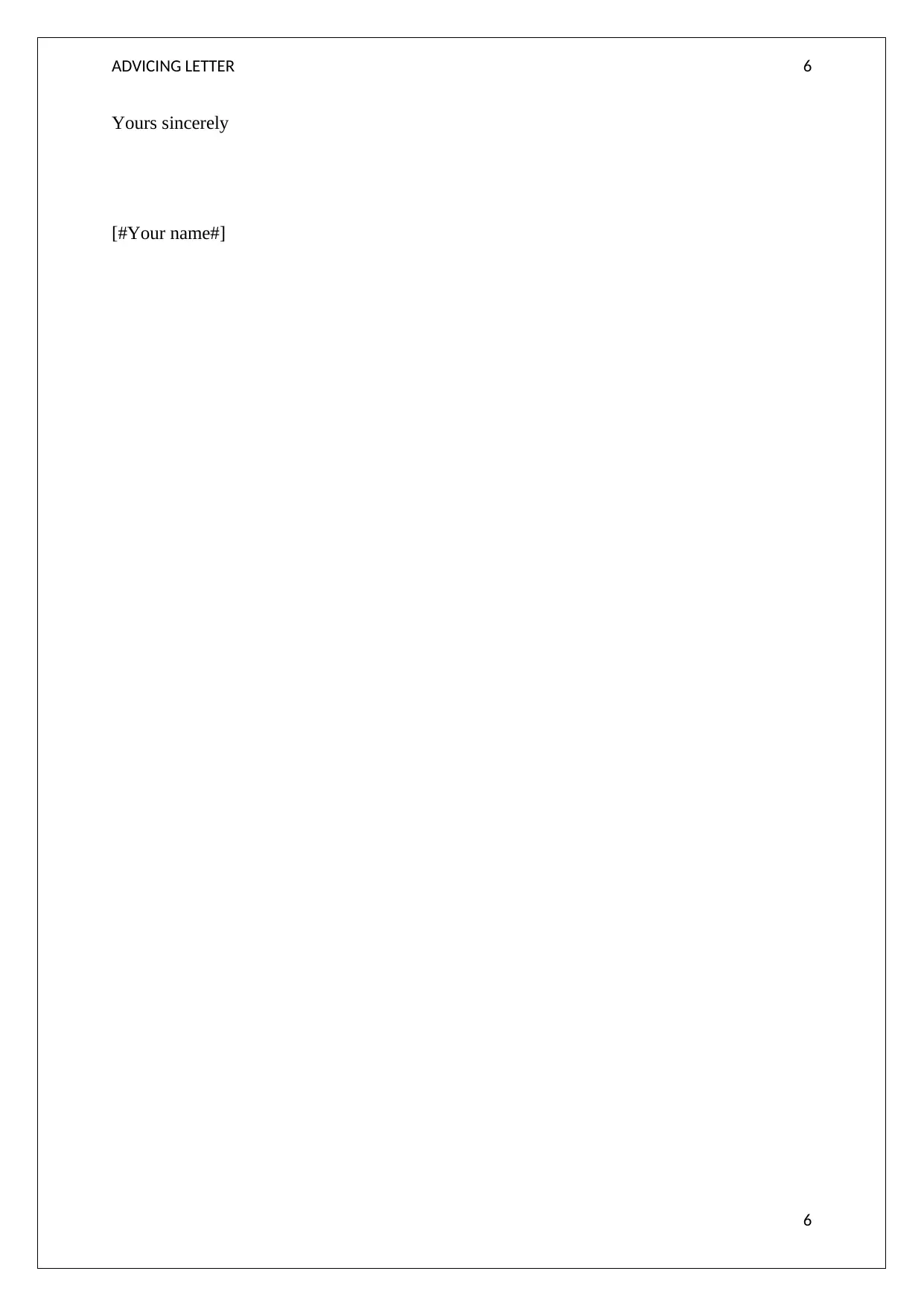
ADVICING LETTER 6
Yours sincerely
[#Your name#]
6
Yours sincerely
[#Your name#]
6
Paraphrase This Document
Need a fresh take? Get an instant paraphrase of this document with our AI Paraphraser
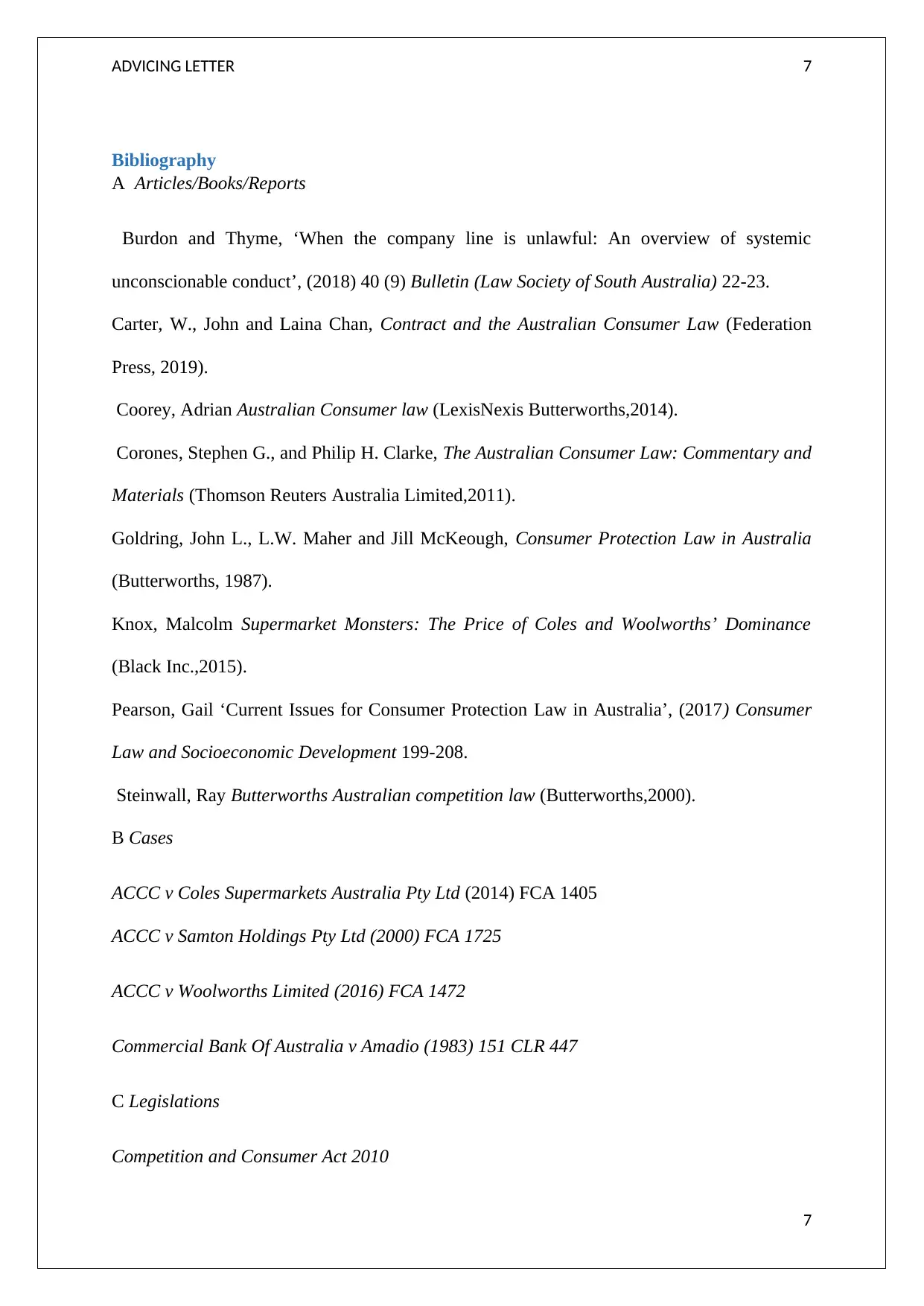
ADVICING LETTER 7
Bibliography
A Articles/Books/Reports
Burdon and Thyme, ‘When the company line is unlawful: An overview of systemic
unconscionable conduct’, (2018) 40 (9) Bulletin (Law Society of South Australia) 22-23.
Carter, W., John and Laina Chan, Contract and the Australian Consumer Law (Federation
Press, 2019).
Coorey, Adrian Australian Consumer law (LexisNexis Butterworths,2014).
Corones, Stephen G., and Philip H. Clarke, The Australian Consumer Law: Commentary and
Materials (Thomson Reuters Australia Limited,2011).
Goldring, John L., L.W. Maher and Jill McKeough, Consumer Protection Law in Australia
(Butterworths, 1987).
Knox, Malcolm Supermarket Monsters: The Price of Coles and Woolworths’ Dominance
(Black Inc.,2015).
Pearson, Gail ‘Current Issues for Consumer Protection Law in Australia’, (2017) Consumer
Law and Socioeconomic Development 199-208.
Steinwall, Ray Butterworths Australian competition law (Butterworths,2000).
B Cases
ACCC v Coles Supermarkets Australia Pty Ltd (2014) FCA 1405
ACCC v Samton Holdings Pty Ltd (2000) FCA 1725
ACCC v Woolworths Limited (2016) FCA 1472
Commercial Bank Of Australia v Amadio (1983) 151 CLR 447
C Legislations
Competition and Consumer Act 2010
7
Bibliography
A Articles/Books/Reports
Burdon and Thyme, ‘When the company line is unlawful: An overview of systemic
unconscionable conduct’, (2018) 40 (9) Bulletin (Law Society of South Australia) 22-23.
Carter, W., John and Laina Chan, Contract and the Australian Consumer Law (Federation
Press, 2019).
Coorey, Adrian Australian Consumer law (LexisNexis Butterworths,2014).
Corones, Stephen G., and Philip H. Clarke, The Australian Consumer Law: Commentary and
Materials (Thomson Reuters Australia Limited,2011).
Goldring, John L., L.W. Maher and Jill McKeough, Consumer Protection Law in Australia
(Butterworths, 1987).
Knox, Malcolm Supermarket Monsters: The Price of Coles and Woolworths’ Dominance
(Black Inc.,2015).
Pearson, Gail ‘Current Issues for Consumer Protection Law in Australia’, (2017) Consumer
Law and Socioeconomic Development 199-208.
Steinwall, Ray Butterworths Australian competition law (Butterworths,2000).
B Cases
ACCC v Coles Supermarkets Australia Pty Ltd (2014) FCA 1405
ACCC v Samton Holdings Pty Ltd (2000) FCA 1725
ACCC v Woolworths Limited (2016) FCA 1472
Commercial Bank Of Australia v Amadio (1983) 151 CLR 447
C Legislations
Competition and Consumer Act 2010
7
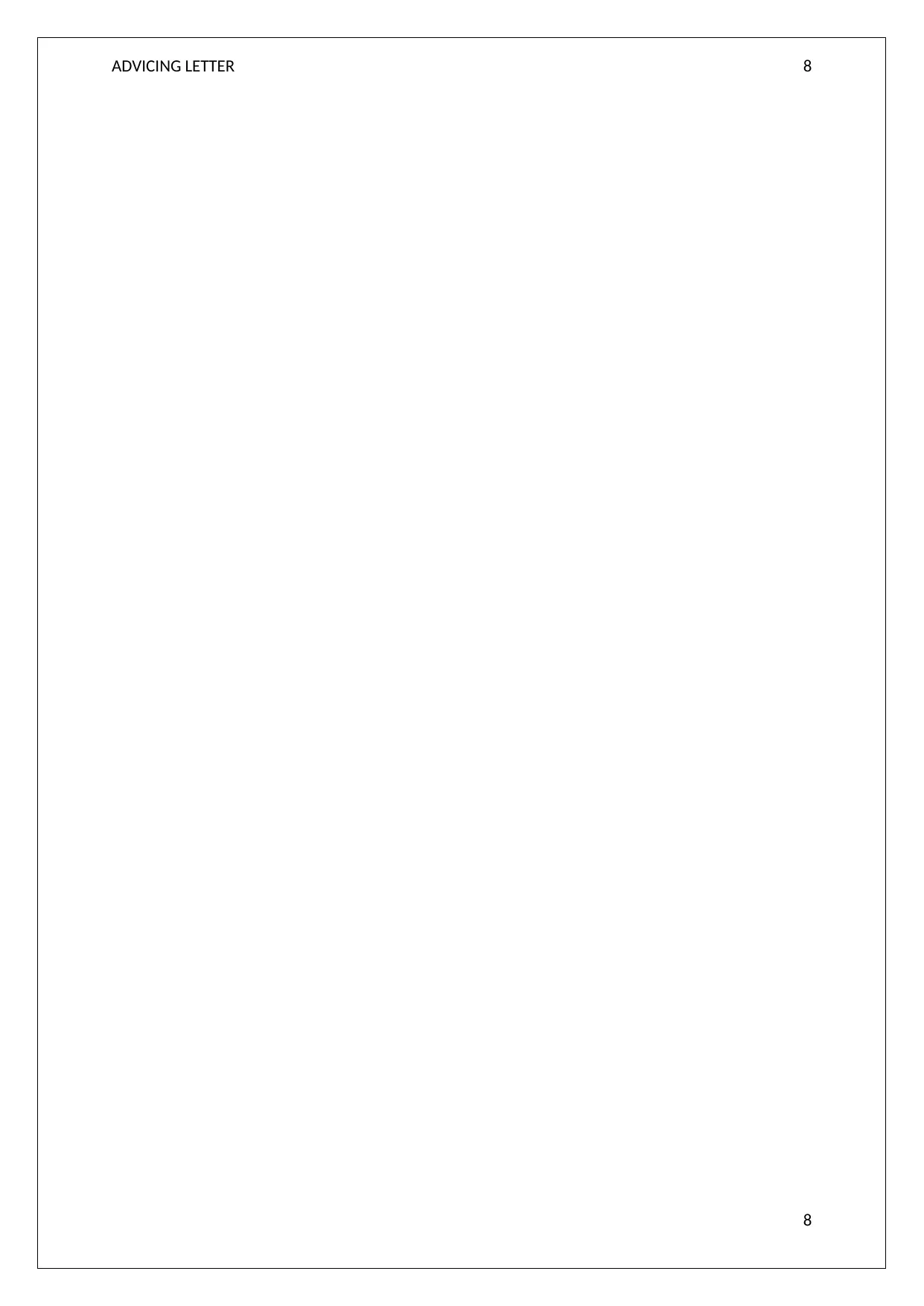
ADVICING LETTER 8
8
8
⊘ This is a preview!⊘
Do you want full access?
Subscribe today to unlock all pages.

Trusted by 1+ million students worldwide
1 out of 9
Your All-in-One AI-Powered Toolkit for Academic Success.
+13062052269
info@desklib.com
Available 24*7 on WhatsApp / Email
![[object Object]](/_next/static/media/star-bottom.7253800d.svg)
Unlock your academic potential
Copyright © 2020–2026 A2Z Services. All Rights Reserved. Developed and managed by ZUCOL.


